Select Home Depot Stores (link for reference only) [
store locator] have
Ryobi ONE+ 18-Volt Cordless Rotary Tool w/ 2Ah Battery & Charger (P460SB) on sale for
$40 available for
In-Store Purchase Only where stock permits (search for / request Home Depot item # 318303839 / UPC barcode # 033287208722).
Thanks to community member
paul123456789 for finding this deal.
- Note, inventory availability is limited and may vary depending on your location.
About this product:- Set includes:
- 1x Ryobi P460 18V ONE+ Rotary Tool (bare tool)
- 1x 36" flexible shaf
- 33xgrinding / cutting / sanding / polishing accessories,
- 1x accessory storage case
- 1x Ryobi P190 2.0 Ah Battery
- 1x Ryobi P118B 18V Lithium-Ion Charger
- Operator's manual
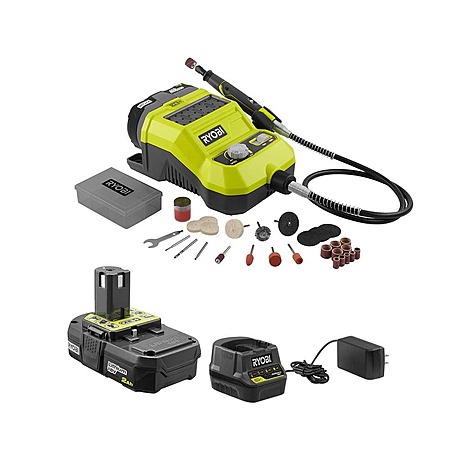
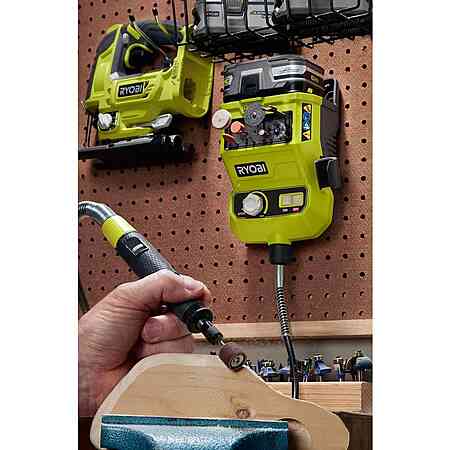
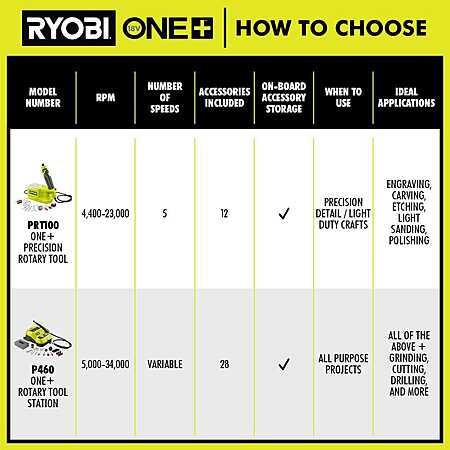
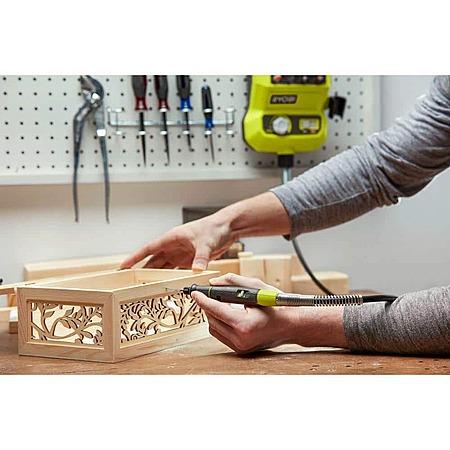
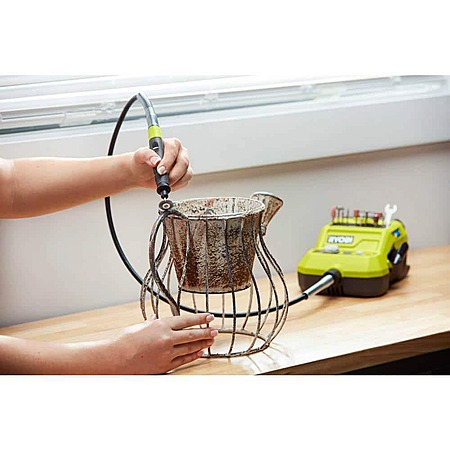
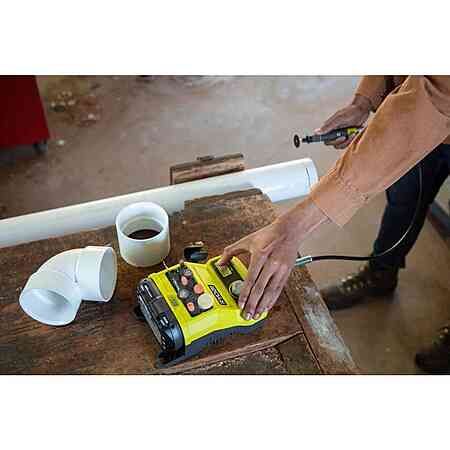



Leave a Comment
Top Comments
- I used it to cut porcelan tile. I bought small diamond cutting discs from Harbor Freight. It worked fine; it took a while but I was going slowly to be careful as these were some small features I was cutting out to fit a new railing post on some existing tiled steps.
- Yes, it bogs down a bit under load as one commenter said.
- I didn't find it overly loud as one commenter said, though yes it is louder than a direct drive handheld dremel with a big motor in your hand. I wear ear protection most of the time anyway. The blade cutting the tile and my shop vacuum running to catch the dust were significantly louder than the tool.
- Yes, it includes the P190 battery. It looks like a cheaper battery (of course, since the whole tool was only $40) and doesn't have a fuel gauge and doesn't charge particularly fast. This is my first Ryobi tool and I just needed something cheap and reasonable quality; most of my other tools are Makita/Dewalt/Festool and those are definitely higher quality and charge faster.
- It's targeting little craft uses like intricate sanding / shaping. It worked fine for the detailed tile cuts that I did but that was pushing its capabilities. I didn't mind spending more time. For bigger tasks I have a pneumatic die grinder and an electric angle grinder; I just felt that I couldn't do the fine/detailed work with those tools without wrecking something.
https://brickseek.com/home-depot-...=318303839
Brickseek link. Pulling product correctly, doesn't seem this package is sold everywhere. In the Cleveland area, I got zero results. In the Detroit area I got some but all were out of stock. Good luck!
They are normally more expensive than equivalent wired tools.
Batteries do not last forever and need to be replaced.
There is no one battery that fits all tools - different brands, voltages, capacities, chargers
Batteries add weight and bulk to hand tools
Some types of tools are simply not as good when battery powered (such as grinders or small table saws)
Batteries need time to charge.
Before buying a cordless tool you should be clear with yourself what you're actually gaining by going cordless because if you don't need the portability it might not be the best choice. Hardware stores want to sell you cordless tools because they know you'll be back for new batteries and you're getting locked into their brands. A good wired tool could last you a lifetime with minimal maintenance, but cordless tools are dependent on the future of their batteries.
33 Comments
Sign up for a Slickdeals account to remove this ad.
https://brickseek.com/home-depot-...=318303839
Brickseek link. Pulling product correctly, doesn't seem this package is sold everywhere. In the Cleveland area, I got zero results. In the Detroit area I got some but all were out of stock. Good luck!
https://brickseek.com/home-depot-...=318303839 [brickseek.com]
Brickseek link. Pulling product correctly, doesn't seem this package is sold everywhere. In the Cleveland area, I got zero results. In the Detroit area I got some but all were out of stock. Good luck!
Our community has rated this post as helpful. If you agree, why not thank CaptGeech
Sign up for a Slickdeals account to remove this ad.
Our community has rated this post as helpful. If you agree, why not thank paul123456789
- I used it to cut porcelan tile. I bought small diamond cutting discs from Harbor Freight. It worked fine; it took a while but I was going slowly to be careful as these were some small features I was cutting out to fit a new railing post on some existing tiled steps.
- Yes, it bogs down a bit under load as one commenter said.
- I didn't find it overly loud as one commenter said, though yes it is louder than a direct drive handheld dremel with a big motor in your hand. I wear ear protection most of the time anyway. The blade cutting the tile and my shop vacuum running to catch the dust were significantly louder than the tool.
- Yes, it includes the P190 battery. It looks like a cheaper battery (of course, since the whole tool was only $40) and doesn't have a fuel gauge and doesn't charge particularly fast. This is my first Ryobi tool and I just needed something cheap and reasonable quality; most of my other tools are Makita/Dewalt/Festool and those are definitely higher quality and charge faster.
- It's targeting little craft uses like intricate sanding / shaping. It worked fine for the detailed tile cuts that I did but that was pushing its capabilities. I didn't mind spending more time. For bigger tasks I have a pneumatic die grinder and an electric angle grinder; I just felt that I couldn't do the fine/detailed work with those tools without wrecking something.
I have a number of tools which I purchased 5+ years ago which I would now want in battery form, if I were to be purchasing them now (but I'm resisting the temptation to replace tools that I already have). In particular, a cordless track saw and a cordless oscillating tool would be great. Large power hungry stuff like roto-hammers and thinset mixers should still be purchased plug-in in my opinion. Also, there's limited utility to battery powered miter saws if your saw never leaves the workshop.
I have a number of tools which I purchased 5+ years ago which I would now want in battery form, if I were to be purchasing them now (but I'm resisting the temptation to replace tools that I already have). In particular, a cordless track saw and a cordless oscillating tool would be great. Large power hungry stuff like roto-hammers and thinset mixers should still be purchased plug-in in my opinion. Also, there's limited utility to battery powered miter saws if your saw never leaves the workshop.
- They are normally more expensive than equivalent wired tools.
- Batteries do not last forever and need to be replaced.
- There is no one battery that fits all tools - different brands, voltages, capacities, chargers
- Batteries add weight and bulk to hand tools
- Some types of tools are simply not as good when battery powered (such as grinders or small table saws)
- Batteries need time to charge.
Before buying a cordless tool you should be clear with yourself what you're actually gaining by going cordless because if you don't need the portability it might not be the best choice. Hardware stores want to sell you cordless tools because they know you'll be back for new batteries and you're getting locked into their brands. A good wired tool could last you a lifetime with minimal maintenance, but cordless tools are dependent on the future of their batteries.One thing to think about is that 18V batteries -> DC brushless motors are actually a better and cheaper electrical solution than cramming an AC motor (or an AC->DC rectifier) into a small handheld tool. I think it's also cheaper for the tool companies to release these low-voltage versions than it is to gain UL/CE approval for a new product which plugs into the wall, so that could result in cordless tools being cheaper. I believe the industry trend towards offering the tool for sale without batteries is an indication of this; the batteries are one of the most expensive pieces. So, perhaps now or in the near future one could save money if multitasking their existing batteries or if $/kWh for quality tool batteries come down to competitive prices. I agree that you have to consider batteries and their lifetime.
For my $0.02, I have 3 Makita batteries which have never been replaced and they work great after ~5 years. I'm a weekday/weekend project warrior type, so not doing this professionally every day. But I'm charging a tool battery every week or so
- They are normally more expensive than equivalent wired tools.
- Batteries do not last forever and need to be replaced.
- There is no one battery that fits all tools - different brands, voltages, capacities
- Batteries add weight and bulk to hand tools
- Some types of tools are simply not as good when battery powered (such as grinders or small table saws).
Before buying a cordless tool you should be clear with yourself what you're actually gaining by going cordless because if you don't need the portability it might not be the best choice. Hardware stores want to sell you cordless tools because they know you'll be back for new batteries and you're getting locked into their brands. A good wired tool could last you a lifetime with minimal maintenance, but cordless tools are dependent on the future of their batteries.Electrically, the only Ryobi batteries in the 18v line that allow for any difference in performance are the ones with additional tabs to provide more amperage to the tool (HP/HP+).
They retain compatibility with tools that don't support HP/HP+ (typically brushed tools) by keeping the primary tab placement in the same spot. Those additional tabs connect to nothing.
Notice how all of the tools in the 18v line still run at 18v max. Varying this voltage will affect the speed of the motor, not the torque. The other part of the equation, the amperage, is limited by the tool, not the battery. If any battery failed to output enough amperage, the tool would not run.
The only other rating on the battery is aH. This is a factor of longevity, not performance.
Simply put: If you want a more powerful tool, you have to either buy an HP+ or go corded. However, if you're looking for longer run time, slap on a bigger battery or go brushless.
Electrically, the only Ryobi batteries in the 18v line that allow for any difference in performance are the ones with additional tabs to provide more amperage to the tool (HP/HP+).
They retain compatibility with tools that don't support HP/HP+ (typically brushed tools) by keeping the primary tab placement in the same spot. Those additional tabs connect to nothing.
Notice how all of the tools in the 18v line still run at 18v max. Varying this voltage will affect the speed of the motor, not the torque. The other part of the equation, the amperage, is limited by the tool, not the battery. If any battery failed to output enough amperage, the tool would not run.
The only other rating on the battery is aH. This is a factor of longevity, not performance.
Simply put: If you want a more powerful tool, you have to either buy an HP+ or go corded. However, if you're looking for longer run time, slap on a bigger battery or go brushless.
A easy way to look this up is a simple Youtube search. Protoolreviews has a couple videos on the topic and Torque Test Channel has more rigorous testing of different batteries with different tools- mostly impact tools, which as a category has a less direct transfer of battery energy to work, as they are more than just motors running, as the impact mechanisms add another player in between.
Sign up for a Slickdeals account to remove this ad.
Electrically, the only Ryobi batteries in the 18v line that allow for any difference in performance are the ones with additional tabs to provide more amperage to the tool (HP/HP+).
Leave a Comment